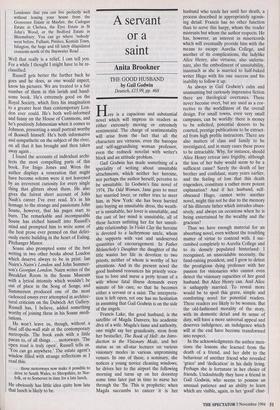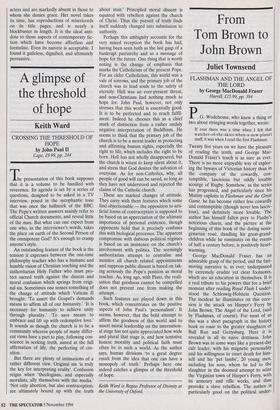A servant or a saint
Anita Brookner
THE GOOD HUSBAND by Gail Godwin Deutsch, £15.99, pp. 468 Here is a capacious and substantial novel which will impress its readers as either extremely moving or extremely sentimental. The charge of sentimentality will arise from the fact that all the characters are virtuous, even the baroque and self-aggrandising woman professor, even the redneck novelist with writer's block and an attitude problem.
Gail Godwin has made something of a speciality of writing about unsuitable attachments, which neither her heroine, nor perhaps the author herself, perceive to be unsuitable. In Godwin's fine novel of 1974, The Odd Woman, Jane goes to meet her married lover, or rather tries to meet him, in New York: she has been harried into buying an unsuitable dress, the weath- er is unsuitable, her lover is unsuitable, and the cast of her mind is unsuitable, all of these factors unfitting her for her unsuit- able relationship. In Violet Clay the heroine is devoted to a lachrymose uncle, whom she supports with vast and undeserved quantities of encouragement. In Father Melancholy's Daughter the daughter of the title wastes her life in devotion to two priests, neither of whom is worthy of her attentions. And in the present novel the good husband renounces his priestly voca- tion to love and nurse a petty tyrant of a wife whose fatal illness demands every minute of his care, so that he becomes either a servant or a saint. The interpreta- tion is left open, yet one has no hesitation in assuming that Gail Godwin is on the side of the angels.
Francis Lake, the good husband, is the satellite of Magda Danvers, his academic diva of a wife. Magda's fame and authority, one might say her grandiosity, stem from her bestseller, The Book of Hell: An Intro- duction to the Visionary Mode, and her status as an all-star lecturer on various visionary modes in various unpromising venues. In one of these, a seminary, she notices a young novice cleaning windows; he drives her to the airport the following morning and turns up on her doorstep some time later just in time to nurse her through the 'flu. This is prophetic; when Magda succumbs to cancer it is her husband who tends her until her death, a process described in appropriately agonis- ing detail. Francis has no other function than to serve this harpy, whom the reader mistrusts but whom the author respects. He has, however, an interest in misericords which will eventually provide him with the means to escape Aurelia College, and another of its complications, the ladylike Alice Henry, also virtuous, also unfortu- nate, also the embodiment of unsuitability, inasmuch as she is married to half-baked writer Hugo with his one success and his inability to follow it up.
As always in Gail Godwin's calm and unassuming but curiously impressive fiction there are theological overtones. These never become overt, but are used as a cor- rective to the worldliness of the overall design. For small towns, even very small campuses, can be worldly: there is money to be solicited, potential donors to be courted, prestige publications to be extract- ed from high profile instructors. There are also matters of class and family to be investigated, and in many cases these prove to be intractable. Why, for instance, should Alice Henry retreat into frigidity, although the loss of her baby would seem to be a sufficient cause? Surely the death of her brother and confidant, many years earlier, and the feeling of loss that this death engenders, constitute a rather more potent explanation? And if her husband, self- obsessed Hugo, cannot write another novel, might this not be due to the memory of his illiterate father which intrudes obses- sively, and always on occasions when he is being entertained by the wealthy and the gracious?
Thus we have enough material for an absorbing novel, even without the troubling matter of virtue to contend with. I suc- cumbed completely to Aurelia College and to its densely populated hinterland: I recognised, an unavoidable necessity, the fund-raising president, and I grew to detest the prestigious dying professor with her passion for visionaries who cannot even detect the visionary capacities of her good husband. But Alice Henry can. And Alice is unhappily married. To reveal more would be to spoil this grave, simple and comforting novel for potential readers. These readers are likely to be women. But the old-fashioned morality of the story, with its domestic detail and its sense of duty, will have a more universal appeal and deserves indulgence, an indulgence which will at the end have become transformed into respect.
In the acknowledgments the author men- tions the lessons she learned from the death of a friend, and her debt to the behaviour of another friend who revealed `grace' and 'dedication' in his daily living. Perhaps she is fortunate in her choice of friends. Undoubtedly they have a friend in Gail Godwin, who seems to possess an unusual patience and an ability to learn which are visible, again, in her 'good' char- acters and are markedly absent in those to whom she denies grace. Her novel takes its time, has reproductions of misericords on its title pages, and is nearly a blockbuster in length. It is the ideal anti- dote to those aspects of contemporary fic- tion which have become affectless and formulaic. Even its naivete is acceptable. I found it guileless, dignified, and ultimately persuasive.











































































 Previous page
Previous page